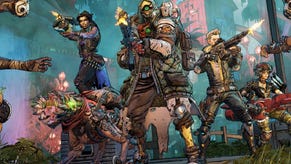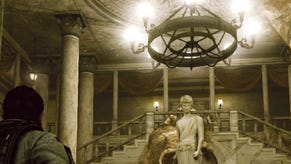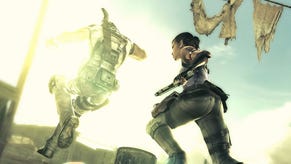Tech Analysis: Resident Evil 6 Demo
Digital Foundry plunges into the guts of the Xbox 360 code.
Resident Evil 5 proved to be a divisive release for the Capcom faithful: the survival horror stylings that had defined the series were unceremoniously given the boot in favour of a more action-orientated experience that felt a touch empty and unsatisfying in single-player mode, but proved to be plenty of fun when played online with a co-op partner. Resident Evil 6, released this week in demo form for Xbox 360, offers a supercharged enhancement of the existing formula, but with a hint of gameplay elements that harken back to the original games.
The demo itself offers a trio of sampler levels, representing the three different campaigns found in the full version of the game (though a fourth is mooted - DLC, anyone?), all of which intersect at different points. The idea is that while the game is primarily a two-player co-op team-up, the intersecting points apparently see multiple players converge seamlessly - an interesting new take on the formula. In terms of the demo itself, the three levels also demonstrate a significant variation in gameplay we can expect to see in the final product.
Leon Kennedy's level, for example, spends a lot of time on story elements (read: unskippable cut-scenes) and has you progressing slowly around a dim environment, helping out a survivor of a bioterrorist attack - with tragic consequences. Gameplay is slow and measured - artificially so, in fact, as the game limits your traversal speed in what seems to be a ham-fisted effort to build up tension. The opposite is actually the result - being hobbled and unable to even draw your weapon kills the tension as you know that nothing will attack you in the meanwhile. Unsuccessful as it is, it does at least hint towards some kind of switch-up of pace in the new game.
On the flipside, Jake Muller - son of the notorious Albert Wesker - enjoys a short demo level which takes the form of an Uncharted-style "dash towards the screen" set-piece followed by a vicious close-quarters boss battle where a bullet-proof behemoth meets his doom - perhaps predictably - via the ubiquitous exploding red barrels. Formulaic, yes, but still plenty of fun.
Finally, there's the Chris Redfield stage, set in a Hong Kong-style cityscape that offers the most traditional third-person shooter gameplay we've seen yet in the Resident Evil series. Here, the infected are much more mobile and are out to get you with automatic weapons and even RPGs. It's Gears of War or Kane and Lynch, albeit with infected, mutating opponents - many of them very familiar to Resi veterans. From a rendering perspective, the complexity of the environments and the sheer volume of enemies tossed your way probably make this the most technically challenging level in the demo code.
"While the gameplay formula looks like a further evolution of the action-orientated Resident Evil 5, the demo suggests a significant variation in gameplay between the three major campaigns."
First impressions - especially from the Jake stage - suggest that not a great deal has changed from a technical perspective compared to Resident Evil 5. Environment and character detail look to be on similar levels to the old game - no bad thing really - and the emphasis on change seems to be mostly in terms of gameplay. Object manipulation is faster and easier, and yes - you can move and fire, though traversal seems to be somewhat laboured compared to, say, Uncharted 3. Interactions with the environment are either scripted (as in Leon's demo stage), or else the A button is used to climb ladders or scramble up onto higher platforms. However, elsewhere we see some fundamental changes to the Resident Evil 5 engine.
The most impactful innovation is the implementation of deferred rendering technology - a new take on lighting that has completely changed the way games are illuminated in the last few years. Computing how lighting affects objects in a traditional forward renderer becomes more and more expensive the more light-sources you add to any given scene. By contrast, deferred shading can conceivably run hundreds of light-sources by breaking down the entire frame into several render targets/frame buffers that each describe particular surface properties in the scene - these are then combined for the final image.
We first saw this technology added to the Capcom MT Framework engine in the recently released Dragon's Dogma, the first open-world title built around the technology, and it's safe to say that it's one of the major success stories of the Resident Evil 6 demo. The Leon section in particular has echoes of the kind of ambience that defined the early Resident Evil titles and with the new technology, dynamic light and shadow can be utilised much more effectively. Across the demo, it's shown at its best in the various cut-scenes, where Capcom also deploys its most detail-rich 3D models.
However, other elements in the visual make-up of the demo aren't quite so successful - indeed, they're downright puzzling. The trade-off in using deferred shading is that traditional multi-sampling anti-aliasing can't be used owing to ballooning memory requirements. The standard solution these days appears to be to switch to a post-process technique, with FXAA being the most popular choice. However, Resident Evil 6 appears to be using a much lower quality edge-smoothing solution that doesn't particularly impress.
"Overall graphical quality is impressive, but the anti-aliasing implementation is poor and the demo build has clear frame-rate issues we hope are resolved in the final shipping game."
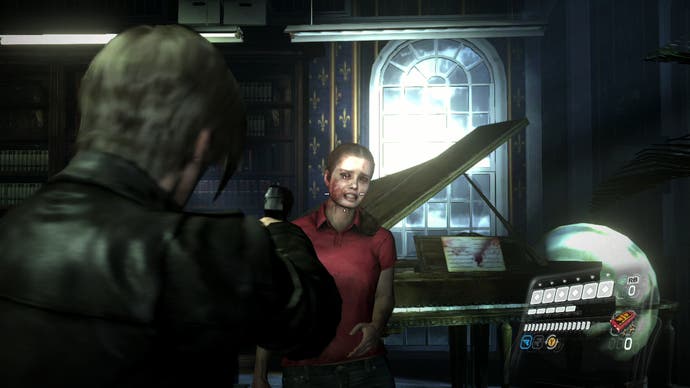
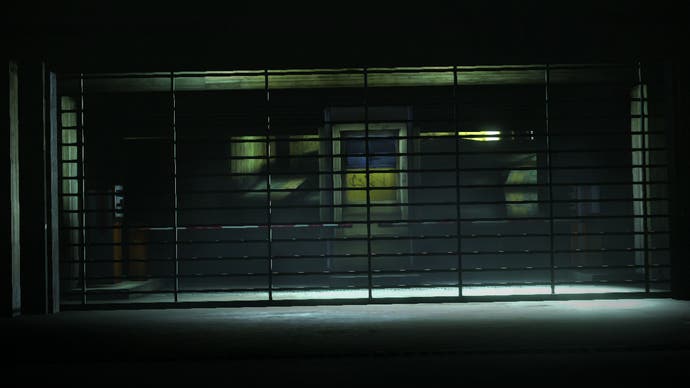
The big issue we have with it comes down to deficiencies in sub-pixel detailing and long edges, with far more "pixel-popping" than we would expect to see from a modern post-process solution. To be frank, it looks rather poor and we would hope that it is either removed completely in the final game or else switched out for FXAA - the eventual route taken by the Dragon's Dogma developers (early footage demonstrated that the devs also experimented with other techniques).
It's safe to say that overall performance in the Resident Evil 6 demo isn't exactly sparkling either, and it's in this respect more than any other that the game feels rough, unfinished and in dire need of some additional optimisation work in places. Based on the three analyses you'll find on this page, it seems to be the case that in this build, RE6 updates the frame with no respect to v-sync at all, meaning the framebuffer is flipped at will, resulting in almost ever-present screen-tear.
The most annoying aspect of this is that the tear-line has a habit of consistently manifesting right in the middle of the screen, exactly where the player is going to notice it most. The fact that the tearing remains in much the same area of the screen for extended periods suggests that the game is actually running at close to a locked 30FPS for extended durations, but with the framebuffer flipping from one image to the next while the display is refreshing.
We have a strong feeling that Resident Evil 6's presentation will be somewhat improved in the final version simply through sequencing the framebuffer flip to occur at the right time, just before the display refreshes. A good example of what we're talking about would be the very beginning of the Leon video on this page - it's a consistent 30FPS, but the double-buffered images are flipped at the wrong time, resulting in the constant tear at the middle of the screen. The same effect manifests throughout the demo, suggesting it is not an isolated bug.
"Screen-tear is the most disappointing aspect of the game's presentation with the screen updating with no respect to v-sync - something we would hope Capcom fixes in the final version of the game."
However, even if we expect this to be fixed, in common with other MT Framework games on the Xbox 360, you should still expect to see plenty of tearing when rendering time exceeds 33ms and frame-rates drop below 30FPS - and it's here that we have plenty of cause for concern. During the first couple of minutes of the Leon video, where the player is moving through the large, open dining room, frame-rate drops as low as 24 frames per second - perhaps because of the increased geometry of the visually more complex scene. Regardless, this is just one example of an area where performance is a real concern, especially as not much is actually going on.
Other problem areas have a fundamental impact on the gameplay as it stands right now: Leon and Helena accosted by a swarm of zombies as they leave the elevator sees a lot of high-detail models in play simultaneously. Frame-rate hits a nadir of around 15FPS and the process of getting those all-important close-range headshots proves to be extremely difficult - there's simply not enough visual feedback. Similarly, the climax of the Chris Redfield demo level - which sees Alpha and Bravo teams hook up to tackle a wave of the infected - sees consistent dips down to 22-24FPS. Control is sluggish and unsatisfying as a result.
Of the three campaign samplers in the demo, it's the Jake stage that holds up most convincingly, with frame-rate only really troubled during cut-scenes and screen-filling explosions. Perhaps not surprisingly it is the least graphically ambitious stage of the three once you enter the main battle arena, though there are some pleasing set-pieces and environmental destruction: in the showdown with the boss, the scenery gets blasted to smithereens as Jake and his partner guide the behemoth from one explosive red barrel to the next.
"With the performance issues we see with the Xbox 360 version, there are obvious concerns about the PS3 game - Capcom's MT Framework titles generally offer higher frame-rates on the Microsoft platform."
In the here and now, only the Xbox 360 Resident Evil demo is available - the PlayStation 3 version has been held back for 60 days. Based on performance of MT Framework games on the Sony platform, there is some additional cause for concern here. Capcom's approach on PS3 is to aim for v-sync: this completely eliminates screen-tear, but new frames are only displayed when the screen refreshes - invariably causing a drop in overall frame-rate. The effect was tangibly felt in Dragon's Dogma, and the worry is that a fast-action shooter like Resident Evil 6 could be even more compromised - especially when we factor in that raw frame-rates on the Xbox 360 version aren't exactly outstanding anyway.
We'll report back on the final code closer to the game's 2nd October release date where we would hope to see some improvements - especially on the bizarre tearing issues. In fairness, the demo does kick off with a warning saying that the game is still in development, and shouldn't be treated as representative of the final game. But it's extremely rare that we actually see much in the way of tangible improvements between samplers and final release - the whole nature of demos is to showcase the product, after all.
Unfortunately, we won't be able to check out the PC version in our upcoming report. In common with Capcom's usual practice, it'll be released sometime in the future - a real shame, since the option to power past performance issues may well prove to be crucial to the Resident Evil 6 gameplay experience.


